WMG News - Latest news from WMG
Self-driving shuttle route set to launch in Solihull
 WMG at the University of Warwick is part of a pioneering project, led by Solihull CouncilLink opens in a new window, to develop a self-driving fully-electric shuttle service at the National Exhibition Centre (NECLink opens in a new window), Birmingham.
WMG at the University of Warwick is part of a pioneering project, led by Solihull CouncilLink opens in a new window, to develop a self-driving fully-electric shuttle service at the National Exhibition Centre (NECLink opens in a new window), Birmingham.
The Solihull & Coventry Automated Links Evolution (SCALE) project is a collaborative initiative, aimed at better understanding the role self-driving vehicles might one day play within our future transport system.
As part of the pilot, SCALE will see a fleet of three electric self-driving shuttles ferry passengers along a new 7km route linking up Birmingham International rail station, the NEC and Birmingham Business Park.
WMG will be focusing on the safety aspect of the shuttle service, providing expertise on hazard analysis, vehicle testing and operational safety.
World’s first open online platform gives public a voice in safety of automated vehicles
WMG, at The University of Warwick, has launched the world’s first online platform that enables the public to influence the development of Automated Vehicle (AV) safety.
 Safety Pool Studio is a driving scenario creation platform for the public to design road scenarios based on their real-life experiences or expectations during the introduction of AVs. The platform aims to empower the public to become part of the safety discussions, making the process more inclusive and accessible.
Safety Pool Studio is a driving scenario creation platform for the public to design road scenarios based on their real-life experiences or expectations during the introduction of AVs. The platform aims to empower the public to become part of the safety discussions, making the process more inclusive and accessible.
The Automated Vehicles Act is now law in the United Kingdom, and AVs could be on the roads as soon as 2026. However, nearly half of UK motorists still do not trust this technology because of safety concerns[1]. This online platform opens a conversation for future users to define and reimagine the safety of AV deployment.
Innovation is key to improving our roads, and it’s great to see WMG, at The University of Warwick backing our vision for safer motoring,” said Lilian Greenwood MP, Minister for the Future of Roads, Department for Transport. “I’m delighted that this pioneering platform will address the questions and concerns people have about Automated Vehicles and enable them to challenge developers to address the real issues they face on our roads. Public engagement will improve understanding of these new technologies and give people the confidence to use AVs when they hit our roads after 2026.”
The platform accounts for different driving styles, types of road layouts, and the movements of vehicles and pedestrians are available on Safety Pool™ Studio. Users from anywhere in the world can tailor-make road-driving scenarios for AVs based on their geographical locations, cultures, and daily practices (in their own languages). Users can also check and trial their scenarios through instant play on the platform.
‘‘The public and the future technology users are paramount to Automated Vehicles’ development and deployment in the UK. By launching Safety Pool™ Studio, our ambition is to democratise safety by prioritising the public’s voices in this new technology, where users can share their expectations and understanding of the safety of AV,” explained Professor Siddartha Khastgir, Head of Safe Autonomy at WMG, the University of Warwick.
“Safety Pool™ Studio also addresses the needs of other stakeholders in the AV ecosystem like developers, incident investigators and insurers, by enabling them to better capture road scenarios during the post-deployment phase of AVs. We strongly believe by doing so, AV deployment will be more inclusive and relevant to our real-world experiences and everybody’s lives.’’
 All these captured scenarios can then be used for virtual testing by the AV ecosystem to test the safety of their systems. Capturing the public’s expectations and real-world incidents enables engineers to replicate potential road situations and assess their products’ safe and timely response to road incidents as part of post-deployment monitoring of the AVs. “We welcome this initiative,” said Steve Gooding, Director, RAC Foundation. “The more we understand about the expectations, uncertainties and concerns that people have about AVs the better the chances of those issues being picked up and addressed in the design process for AV development and adoption, that’s why engaging the public is so important and that’s why making it easier for them to do so really matters.
All these captured scenarios can then be used for virtual testing by the AV ecosystem to test the safety of their systems. Capturing the public’s expectations and real-world incidents enables engineers to replicate potential road situations and assess their products’ safe and timely response to road incidents as part of post-deployment monitoring of the AVs. “We welcome this initiative,” said Steve Gooding, Director, RAC Foundation. “The more we understand about the expectations, uncertainties and concerns that people have about AVs the better the chances of those issues being picked up and addressed in the design process for AV development and adoption, that’s why engaging the public is so important and that’s why making it easier for them to do so really matters.
“It is appropriate that an approach aimed at engaging the public in the development and deployment of new technology should itself be using technology as the basis for that engagement, and we encourage everyone to give it a try.”
Organisations wishing to work with the research and Safety Pool™ Studio can contact SafeAutonomy@warwick.ac.uk or visit https://safetypoolstudio.ai
Wayve and WMG launch DriveSafeAI
WMG at the University of Warwick and WayveLink opens in a new window, a leader in Embodied AI for autonomous driving, have launched the DriveSafeAI microsite - a dedicated platform to share insights, research, and tools focused on AI safety assurance in assisted and automated driving technology.
The new microsite, Drive-Safe.aiLink opens in a new window, is part of the broader DriveSafeAI initiative and serves as a hub for industry professionals, researchers, and policymakers. Through this platform, Wayve and WMG will share information about novel safety validation methods to give regulators confidence in AI used in assisted and automated vehicles (AV). DriveSafeAI focuses on four pillars of technical AI safety assurance, covering scenario generation, architecture, model evaluation, and sim validation.
The DriveSafeAI projectLink opens in a new window is part of the Centre for Connected and Automated Vehicles’ (CCAV)
Commercialising CAM Supply Chain Competition (CCAMSC). This programme, aimed at advancing connected and automated mobility (CAM), is funded by CCAV - a joint initiative between the Department for Business and TradeLink opens in a new window, and the Department for TransportLink opens in a new window. It is delivered in partnership with Innovate UKLink opens in a new window and ZenzicLink opens in a new window.
Dr Sarah Gates, Director of Public Policy, Wayve explained: “Regulators need to have confidence in how AI is used in assisted and automated driving, which is why we need clear safety validation methods. DriveSafeAI is a model for developing evidenced-based safety frameworks that can build regulator and stakeholder confidence, driving innovation while ensuring the highest safety standards. This balanced approach enables safe technology development that will lead to safer roads and a more robust global AV market.”
 Professor Siddartha KhastgirLink opens in a new window, Head of Safe Autonomy, WMG, the University of Warwick said: “The use of AI in safety-critical applications like automated driving poses a huge challenge for the automotive industry. Solving this requires broad collaboration between industry, academia, and policymakers. Through DriveSafeAI, partnering with a leading embodied AI organisation like Wayve, WMG can create a robust and novel safety approach to AI while enabling scalability and innovation. We are generating the scientific evidence to underpin industry-wide standards and international regulations for the safety of AI, building confidence in the AV ecosystem.”
Professor Siddartha KhastgirLink opens in a new window, Head of Safe Autonomy, WMG, the University of Warwick said: “The use of AI in safety-critical applications like automated driving poses a huge challenge for the automotive industry. Solving this requires broad collaboration between industry, academia, and policymakers. Through DriveSafeAI, partnering with a leading embodied AI organisation like Wayve, WMG can create a robust and novel safety approach to AI while enabling scalability and innovation. We are generating the scientific evidence to underpin industry-wide standards and international regulations for the safety of AI, building confidence in the AV ecosystem.”
Wayve and WMG remain committed to advancing automated driving through rigorous safety protocols and transparent research. Over the next year, the partners will regularly update the microsite with new findings as they progress their research.
For more information and to follow updates on this project, visit Link opens in a new windowhttps://drive-safe.ai/Link opens in a new window.
Automated Vehicle Bill receives Royal Assent
Expert comment from Professor Siddartha Khastgir, Head of Safe Autonomy at WMG, University of Warwick.
‘‘I am thrilled that the Automated Vehicle (AV) Bill has received Royal Assent today. The Bill (now Act) has laid a sound regulatory foundation for the AV industry in the UK. This is a first but important step to introducing AVs safely to the UK’s roads.
"I support the government’s ambition that AVs should be as safe as a careful and competent human driver; we therefore, urge the government to undertake swift work on the secondary legislation with a more robust focus and detailed definition of the performance requirements, keeping safety as our highest priority going forward. This will also provide certainty and clarity for technology developers and the AV industry. WMG will continue to work with the UK’s policymakers and provide research evidence to underpin AV policies, including the secondary legislation.
“At WMG, we have also been advocating for ‘informed safety’, which means that users understand the limitations and capabilities of the technology and can use AVs within this safety limit. I am glad that the Act has a strong focus on tackling misleading marketing of AVs. Information about self-driving vehicles should be communicated precisely and transparently to the public so everyone feels safe and confident when engaging with AVs. The public is core to this technology: if they don’t trust it, they will never use it.
 “To bring the public on this self-driving journey and bridge the knowledge gap, the Partners for Automated Vehicle Education United Kingdom (PAVE UK) was co-founded earlier this year by WMG, the Department for Transport, the Department for Business and Trade, the Centre for Connected and Autonomous Vehicles and Transport for West Midlands to deliver accurate and inclusive public awareness and education programmes on self-driving technology.
“To bring the public on this self-driving journey and bridge the knowledge gap, the Partners for Automated Vehicle Education United Kingdom (PAVE UK) was co-founded earlier this year by WMG, the Department for Transport, the Department for Business and Trade, the Centre for Connected and Autonomous Vehicles and Transport for West Midlands to deliver accurate and inclusive public awareness and education programmes on self-driving technology.
“WMG will continue to work closely with the government and the eco-system to help set strong performance requirements, ensuring the safe deployment of self-driving vehicles on the UK’s roads, and enabling the country to be the hub of this transformational transport technology.’’
New national initiative to educate the public on automated vehicles (AVs)
Today (Wednesday 21st February 2024), WMG at The University of Warwick, has launched the Partners for Automated Vehicle Education United Kingdom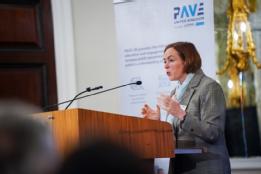 (PAVE UK) with the Department for Business and Trade, the Department for Transport, the Centre for Connected and Autonomous Vehicles (CCAV), and Transport for West Midlands, as its founding partners.
(PAVE UK) with the Department for Business and Trade, the Department for Transport, the Centre for Connected and Autonomous Vehicles (CCAV), and Transport for West Midlands, as its founding partners.
The PAVE UK initiative aims to build public confidence in self-driving technology through a programme of education and engagement, supporting the UK Government’s ambition to safely deploy self-driving vehicles on the road and its aim to make the UK the leader in artificial intelligence (AI).
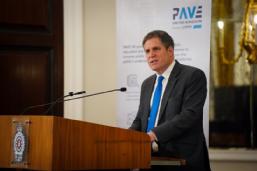 PAVE UK is the country’s first non-governmental organisation that advocates for and delivers public education and engagement programmes on automated vehicles. It launched today at the Royal Automobile Club in London, with Anthony Browne MP (Technology and Decarbonisation Minister), and Professor Sarah Sharples (Chief Scientific Adviser at the Department for Transport), as the keynote speakers. Over 100 technology developers, safety campaign groups, regulators, innovators, and industry leaders discussed how to ensure the public is engaged in the self-driving technology journey and how to accurately communicate AV safety messages with different stakeholders in society.
PAVE UK is the country’s first non-governmental organisation that advocates for and delivers public education and engagement programmes on automated vehicles. It launched today at the Royal Automobile Club in London, with Anthony Browne MP (Technology and Decarbonisation Minister), and Professor Sarah Sharples (Chief Scientific Adviser at the Department for Transport), as the keynote speakers. Over 100 technology developers, safety campaign groups, regulators, innovators, and industry leaders discussed how to ensure the public is engaged in the self-driving technology journey and how to accurately communicate AV safety messages with different stakeholders in society.
Professor Siddartha Khastgir, Head of Verification & Validation at WMG, University of Warwick said: "At WMG, we strive to enhance the safety of self-driving technology and ensure it is safe to operate on the roads. In taking a people first approach, the public should be paramount in the safety conversation and part of the journey during the development and deployment of self-driving vehicles on UK roads.
“PAVE UK will translate technical information into clear, comprehensive and accurate messaging to help communicate safety to the public in an inclusive and accessible manner. Future technology users and other road users will be equipped with the knowledge of benefits and limits of this new transport technology. PAVE UK will also bring together the self-driving ecosystem to tackle the technological challenges, speak honestly and accurately about system capabilities and limitations, and encourage innovators to put the public at the heart of this.”
PAVE UK will work closely with the entire UK Connected and Automated Mobility (CAM) ecosystem, to carry out education and engagement programmes, such as research-based educational materials packs, school outreach activities, community outreach, an online video library, webinars, and an online educational app. The programme will be delivered by WMG at the University of Warwick.
Nusrat Ghani MP, Minister for Industry and Economic Security, said: “The UK automotive sector is at the cutting edge of exploiting new innovative technologies. These have the potential to create jobs, grow the economy and accelerate how we reach net-zero.
“This government has shown time and time again that we're committed to creating the right conditions to boost UK advanced manufacturing, and the PAVE UK initiative will help cement the UK as a world leader in self-driving technology."
Technology and Decarbonisation Minister Anthony Browne said: “Self-driving vehicles have the potential to transform our transport sector, and PAVE UK will be a big part of this by raising awareness and embedding confidence in people throughout the country. In the meantime, we’re making sure that these vehicles are safe to use on our roads. Our Automated Vehicles Bill sets a rigorous standard for safety, whilst making sure that this country is where businesses can develop and deploy their cutting-edge technology.”
Organisations and schools wishing to participate in the programmes can contact PAVEUK@warwick.ac.uk
Ends
Note to editors
Additional quotes
Tara Andringa, Executive Director, PAVE said: "When PAVE was founded in 2019, it was a bet on the power of knowledge: we believed that if the public understands the facts of autonomous vehicles, we will see greater public trust in this incredibly promising technology. Our campaign both seeks to demystify automated vehicles– to explain how the technology works – and to help the public understand how these technologies could help to improve the safety, efficiency, and sustainability of our transportation system.
“While countries and regions have adopted different regulatory approaches to automated vehicles, the challenge of AV education is global in nature. Given the tremendous leadership from the UK both in its approach to AV policy and to civic engagement on the technology, we are incredibly excited for the influential role PAVE UK will play in leading public education. The PAVE ecosystem is thrilled for the launch of PAVE UK, and we will work together to build an engagement campaign that will create a template for AV education worldwide."
Automated Vehicles Bill: https://bills.parliament.uk/bills/3506
About WMG, University of Warwick
WMG is a world leading research and education group, transforming organisations and driving innovation through a unique combination of collaborative research and development, and pioneering education programmes.
As an international role model for successful partnerships between academia and the private and public sectors, WMG develops advancements nationally and globally, in applied science, technology and engineering, to deliver real impact to economic growth, society and the environment.
WMG’s education programmes focus on lifelong learning of the brightest talent, from the WMG Academies for Young Engineers, degree apprenticeships, undergraduate and postgraduate, through to professional programmes.
An academic department of the University of Warwick, and a centre for the HVM Catapult, WMG was founded by the late Professor Lord Kumar Bhattacharyya in 1980 to help reinvigorate UK manufacturing and improve competitiveness through innovation and skills development.
About PAVE UK
PAVE UK aims to bring the conversation about automated vehicles (AVs) to the public so that future users and technology developers can play a role in shaping our future.
By arranging education and engagement programmes around AVs, our goal is to increase the public’s awareness of the capabilities and limitations of the technology and build up societal acceptance and trust in this new transport innovation. We also aim to develop a correct user attitude to foster the safe deployment of AVs.
We strongly believe that by fully and transparently equipping the public with CAM technology knowledge, we could then achieve the potential benefits of the technology.
Media contact:
Annie Slinn
Communications Officer (Sciences)
Gabbie Lau
WMG Marketing and Communications Officer (Verification and Validation Research Group)
Expert comment from Professor Siddartha Khastgir
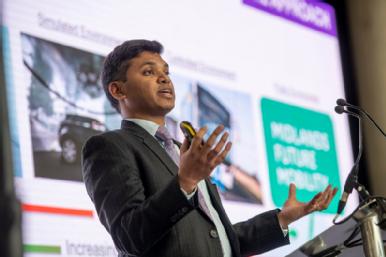 Professor Siddartha Khastgir, Head of Verification and Validation at WMG, University of Warwick, comments on the Government’s plans to introduce the primary legislation for automated vehicles in the upcoming parliamentary session, as announced in the King’s Speech today (Tuesday 7th November).
Professor Siddartha Khastgir, Head of Verification and Validation at WMG, University of Warwick, comments on the Government’s plans to introduce the primary legislation for automated vehicles in the upcoming parliamentary session, as announced in the King’s Speech today (Tuesday 7th November).
Professor Khastgir said: ‘‘We welcome the Government’s decision to introduce the primary legislation on automated vehicles in the King’s Speech today. Following on from the discussions at the AI Safety Summit last week, this very first legislation on AI-powered technology is an important step for the UK to reach its target of rolling out automated cars in 2025.
“Regulation is the key enabler for the safe introduction of automated vehicles on UK roads. Not only does it provide regulatory certainty for the industry, but it is also key to setting high safety thresholds and gaining the public’s trust. We urge the Government to ensure that the regulatory framework is robust and underpinned by strong research outcomes. International and national self-driving standards should be built upon when creating this legislation.
“We also urge the Government to speed up the secondary legislation on automated vehicles to provide more information on the engineering requirements. The Government needs to ensure public views are incorporated into this legislative journey and take future users’ viewpoints into account. As a result, along with the legislation, a public awareness programme should be introduced to ensure an accurate understanding of the capabilities and limitations of this emerging technology. The Government needs to act quickly to be at the forefront of this technology.
“WMG will continue to fully support the Government and the eco-system to develop research and evidence-based self-driving regulation in the UK.’’
Find out more about WMG’s Verification and Validation research here: https://warwick.ac.uk/fac/sci/wmg/research/cav/vandv/
Safety Must Come First: WMG Professor on Cruise Pausing Driverless Operations to Rebuild Trust
 Professor Siddartha Khastgir, Head of Verification and Validation at WMG, University of Warwick, comments on Cruise pausing all driverless robotaxi operations in the US to rebuild public trust.
Professor Siddartha Khastgir, Head of Verification and Validation at WMG, University of Warwick, comments on Cruise pausing all driverless robotaxi operations in the US to rebuild public trust.
“Safety is the number one priority when commercialising self-driving vehicles, we should never compromise safety even though this is a fast-paced technology. The industry and autonomous vehicle developers and operators need to have a thorough review of the current incidents and be more open and transparent regarding their safety assurance processes and systems.
“Safety messages and information should be communicated to the public to gradually build up societal trust and ensure that technology users and road users are well-informed about this new technology’s capabilities and limitations.
“As a world-leading research institution, WMG is working closely with international and national policymakers, regulators, and industry to improve the safety of self-driving vehicles. We encourage the ecosystem to collaborate further to gain the public’s confidence in this emerging transport technology.”
Find out more about WMG’s Verification and Validation research here: https://warwick.ac.uk/fac/sci/wmg/research/cav/vandv/
WMG research shapes the future of autonomous vehicles
WMG, at the University of Warwick, is part a unique £2 million consortium, entitled Sim4CAMSens.
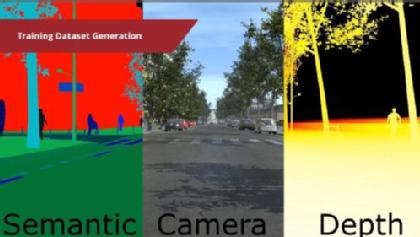 The Sim4CAMSens project, led by Claytex, is made up of a consortium of prominent industry partners, including AESIN, rFpro, Syselek, Oxford RF, National Physical Laboratory, Compound Semiconductor Applications Catapult and WMG.
The Sim4CAMSens project, led by Claytex, is made up of a consortium of prominent industry partners, including AESIN, rFpro, Syselek, Oxford RF, National Physical Laboratory, Compound Semiconductor Applications Catapult and WMG.
Together the consortium will create a framework for sensor evaluation that incorporates modelling, simulation, and actual testing. In order to enable Automated Driving Systems (ADS) and sensor developers to speed their development, this project will involve the development of new models for sensors, noise and materials, and new test methodologies.
The role of WMG will be to understand which noise factors have the higher impact on the different perception sensors (i.e., camera, LiDAR, RADAR,) and how to correlate virtual testing to real-life testing to support the entire supply chain.
Professor Valentina Donzella, who leads the Intelligent Vehicles Sensors research at WMG explains: “The Sim4CAMSens project is an extremely exciting opportunity for WMG, to work with UK based world leading industrial and research partners, to speed up the development of sensors models and testing methodologies. These are key considerations for the future safe deployment of robust and reliable ADS. The success of this project will ensure the UK leads the way globally in this field."
Find out more about WMG’s Intelligent Vehicles Sensors research here: https://warwick.ac.uk/fac/sci/wmg/research/cav/ivsensors
WMG with Solihull Council secure £300,000 for self-driving shuttle feasibility study
WMG at The University of Warwick, Solihull Council, National Highways, Transport for West Midlands, ZF, Aurrigo, Syselek and Liftango have successfully secured £300,000 to deliver a project looking into the feasibility of a self-driving shuttle service in the West Midlands.
The project will explore how a new automated transport link between Blythe Valley Business Park, near Shirley, and the new HS2 rail station in Solihull could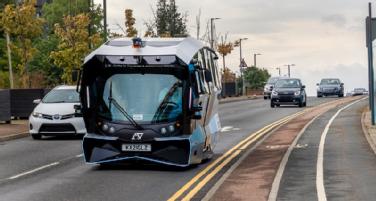 operate in the future. The feasibility study will consider all aspects of the technology required in order to provide a safe and reliable automated public transport service between these important commercial centres. The proposed route would use the existing road network travelling along the M42 from Junction 4 and utilise the new Junction 5a currently under construction.
operate in the future. The feasibility study will consider all aspects of the technology required in order to provide a safe and reliable automated public transport service between these important commercial centres. The proposed route would use the existing road network travelling along the M42 from Junction 4 and utilise the new Junction 5a currently under construction.
As a world-class research institution with leading capabilities in the verification and validation of safety assurance of self-driving technologies, WMG will apply its Operational Design Domain (ODD) based Safety Assurance research methodologies to the specific project challenges.
This project is part of the wider Midlands Future Mobility (MFM) initiative, led by WMG. The MFM vision is to achieve zero road incidents, net-zero emissions and inclusive transport in the West Midlands. MFM enables stakeholders from across mobility to address the interlinked challenges of technology, policy, and behaviour to realise the vision.
Cllr Ken Hawkins, Solihull Council Cabinet Member for Environment & Infrastructure, said: “Connected Automated Vehicle (CAV) technology has the potential revolutionise the way we get around our towns, cities and rural areas. Working with our partners we are excited to be undertaking this latest project.
“We’ve already carried out a series of successful pathfinder trials here in Solihull, using our own automated shuttle, and have led the way in showing how it is possible to practically and safely incorporate automated vehicles into our existing transport infrastructure. We are now taking the next step and undertaking the vital feasibility work necessary in order to start thinking about more ambitious deployments and establishing new commercial public transport services.
“The outcomes from the study are likely to inform self-driving mobility challenges not just here in Solihull but nationwide.”
Jonathan Smith, Midlands Future Mobility Programme Manager said: "The business case for scaling new mobility solutions is complex. It involves a granular understanding of the use case, safety, users, operations, and infrastructure. This project brings together a group of diverse experts to apply state of the art research and knowledge to address this question. Of critical importance is that the outcomes of this feasibility will inform mobility business cases both in the Midlands and the UK as a whole."
More information about this project
Partners: Solihull Metropolitan Borough Council (Lead), Aurrigo, Syselek (Uk) Ltd, Liftango Ltd, ZF Services UK Limited, West Midlands Combined Authority, Highways England, University of Warwick
Grant awarded: £300,000 (£197,664 from Centre for Connected and Autonomous Vehicles’ Commercialising Connected and Automated Mobility programme and balance is made up by the commercial partners).
Find out more about WMG’s Validation and Verification research here: Verification and Validation (warwick.ac.uk)
Note to editors
Media contact:
Annie Slinn
Communications Officer (Sciences)
Gabbie Lau
WMG Marketing and Communications Executive
Self-driving cars will be part of the future – but researchers fear we are leaving the disabled behind
 Self-driving cars will be part of the future, but researchers fear people with disabilities are being left behind in the development of the technology.
Self-driving cars will be part of the future, but researchers fear people with disabilities are being left behind in the development of the technology.
Over the past two decades, transportation has become more accessible, but people with disabilities still face significant barriers to accessing these services. While self-driving cars (also known as autonomous vehicles) have the potential to dramatically improve the lives of those with disabilities, helping them to travel independently, experts fear their views are being neglected in the development of the new technology
To address this, researchers from WMG at The University of Warwick and leading disability charities have considered the impact of self-driving taxis on people with disabilities, an area that has seen limited improvement over recent years.
They found that the absence of a driver was strongly correlated with feelings and perceptions of increased travel freedom, indicating that autonomous taxis could provide greater accessibility for those with disabilities – without the limitations or biases associated with their current experiences with traditional taxis and drivers.
The team also considered current issues people who have disabilities face with transport – particularly in booking taxi journeys. Participants expressed concerns about driver attitudes and behaviour as negative experiences with traditional taxis.
Lead author Shravani Sharma, PhD Researcher, WMG, University of Warwick, said: “Our research highlights the current issues those with disabilities face when booking taxis – with many reporting that their trips have been cancelled due to their use of a wheelchair. Drivers might feel the extra time wheelchairs add to journeys would reduce their earnings. While there are laws in place preventing black cab drivers cancelling journeys for those with wheelchairs – there are no such laws for other companies.
“Self-driving taxis could provide those with disabilities more freedom and reduce fear of discrimination. So, it’s crucial we listen to their opinions in developing the technology.
“We worked with charities including CASBA (Citizen Advocacy South Birmingham Area), which supports people with learning difficulties, Royal National Institute of Blind People (RNIB) and Cerebral Palsy Midlands to name a few, providing a wide range of voices and expertise. This represented many different visible and non-visible disabilities – including blindness, mobility problems, hearing loss, cerebral palsy and ADHD amongst others. The perspectives of more than 39,000 different organisation members were included.
“Alongside the current problems those with disabilities face when booking taxis, we highlighted their concerns for future, self-driving taxis. The main concern was the availability of human assistance to meet specific user needs throughout the journey.”
Examples of concerns for future, self-driving taxis:
- The challenges faced by individuals in wheelchairs when attempting to enter a car without assistance are multifaceted. Tasks include placing their wheelchair inside the car, securing themselves within it, disassembling and carefully navigating the wheelchair upon departure.
- For those with visual impairments, the struggle lies in identifying their vehicle within a crowded setting, such as a bustling railway station.
- The loss of social interactions and the light-hearted atmosphere during journeys. Many individuals with disabilities unfortunately contend with feelings of loneliness and isolation, making everyday conversations a vital source of companionship and comfort throughout their journey.
Shravani added: “It is also important that manufacturers consider the wide range of disabilities and the intricate needs for passengers – remembering that not all disabilities are visible.”
Dr Roger Woodman, Head of Human Factors, at the University of Warwick, said: “Self-driving vehicles will open up driving to people that have never been on their own in a vehicle before. It has the potential to transform their lives – with reduced reliance on others to help them get from A to B.
“Driving is a very complex task to complete, so self-driving cars could enable someone with a disability, for example, cerebral palsy or tremors, to simply press a button and go.
Ginny Cullen, CEO of CASBA, added: “CASBA exists to ensure people with learning disabilities speak up for themselves, express their views, make their choices, and are valued as citizens. We were therefore delighted to have had the opportunity to be included in this research on new autonomous vehicles to ensure driving is accessible to all.”
CASE STUDIES – both available for media interviews upon request
Jen Brown
“I have a lot of trouble with the buses. I use a walker and they don’t lower the bus, making it very hard for me to get on and off.
“I had a lot of stress with a taxi company. I often travel from Kingstanding to Northfield. The taxi company didn’t want to take the job and sometimes cancelled, leaving me stressed and late for work. Sometimes I was not able to get home from work.
“I went to a food show in November, when I got to the station the lift was out of order. I walked round the station looking for staff to help, no one and there was no one in the office. I phoned mom and dad see if they could find a number. I had to end up putting my walker on the escalator which was very dangerous.
“I nearly got locked on the train once. I have regular visits to the Severn Valley Railway and am used to the journey. When got to Snow Hill the train stopped, and I thought it was waiting for the signal. People started to get off the train, and I didn’t know why, I decided to get off and just as I did the lights went off and the doors closed. It said on the screen it was cancelled and with my hearing impairment I couldn’t hear the announcement.
Jen added her thoughts on what difference self-driving taxis would make to her life. She said: “When I finish work, I feel very tired and don’t want to talk. I just want to relax on my way home. Also, with my hearing impairment if the windows are open, I can’t hear the driver and just guess as what he is saying. Self-driving taxis would cause me less stress and worry as I wouldn’t have to worry about what the driver is saying to me.”
Michaela Mooney
“I think some people misjudge invisible disability. I may look like I can do things like everyone else but it has a high energy cost for me; my joints hurt and sometimes dislocate so when there's no seats on a bus it can be a struggle. I fall over a lot, sometimes slam doors by accident and when people don't understand what happens it can be hard mentally and physically. I think a self-driving car would mean more independence as you don't have to depend on someone to get around.”
Notes to Editors
Shravani’s research also highlights:
- This is the right time to involve many such organisations that work with people with disabilities to understand user needs via consultations, pilots, and testing.
- Presently, autonomous vehicles and other transport related studies primarily focus on addressing physical disabilities. This emphasis is evident even in signage, consistently featuring wheelchair symbols. However, the breadth of this spectrum encompasses a wide array of conditions. Consequently, it is imperative for brands to acknowledge and cater to these varied requirements and this research can be a basepoint for such engagements.
- This type of research of understanding user-specific needs and requirements will be useful for many such emerging technologies for the equitable rate of adoption to reach the overarching goal of inclusivity and accessibility.
- Future research will also consider more intelligent human machine interaction that can have a social touch to it, for example, personalised conversation nuances, or even adding diverse accents to computer generated voices.
